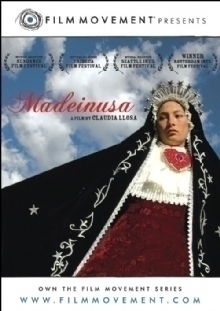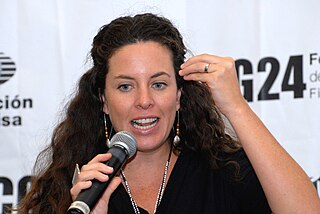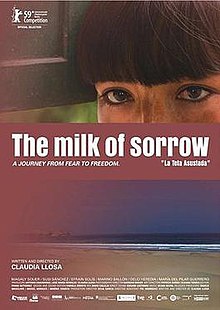
The Shining Path, officially the Communist Party of Peru, is a far-left political party and guerrilla group in Peru, following Marxism–Leninism–Maoism and Gonzalo Thought. Academics often refer to the group as the Communist Party of Peru – Shining Path to distinguish it from other communist parties in Peru.

María Elena Moyano Delgado was an Afro-Peruvian community organizer and feminist who was assassinated by the Shining Path. She grew up in poverty in the Villa El Salvador pueblo joven, then became involved in local activism. She was twice president of FEPOMUVES and at the time of her death was deputy mayor. Her funeral was attended by 300,000 people and resulted in a downturn in support for the Shining Path. She received the Peruvian Order of Merit posthumously.

Quechua people or Quichua people may refer to any of the indigenous peoples of South America who speak the Quechua languages, which originated among the Indigenous people of Peru. Although most Quechua speakers are native to Peru, there are some significant populations in Ecuador, Bolivia, Chile, Colombia, and Argentina.

While the Peruvian film industry has not been nearly as prolific as that of some other Latin American countries, such as Mexico or Argentina, some Peruvian movies produced enjoyed regional success. Historically, the cinema of Peru began in Iquitos in 1932 by Antonio Wong Rengifo because of the rubber boom and the intense arrival of foreigners with technology to the city, and thus continued an extensive, unique filmography, with a different style than the films made in the capital, Lima.

Martha Lupe Moyano Delgado is a Peruvian nurse, Fujimorist politician and a congresswoman representing Lima for the 2021–2026 term, previously serving in the 2000–2001, 2001–2006, and 2006-2011 terms. Moyano belongs to the Alliance for the Future party. She is the sister of María Elena Moyano, who was assassinated by Shining Path.

Retablos are a sophisticated Peruvian folk art in the form of portable boxes which depict religious, historical, or everyday events that are important to the Indigenous people of the highlands. It is a tradition originated in Ayacucho.

Madeinusa is a 2006 Peruvian-Spanish drama film directed by Claudia Llosa.
State of Fear: The Truth about Terrorism (2005) is a documentary film produced by Skylight Pictures and directed by Pamela Yates. It won the 2006 Overseas Press Club Award for "Best Reporting in Any Medium on Latin America". It has been translated into 48 languages and broadcast in 157 countries.

Claudia Llosa Bueno is a Peruvian film director, writer, producer, and author. She is recognized for her Academy-Award-nominated film The Milk of Sorrow.
Magaly Solier Romero is a Peruvian actress and singer.

Altiplano is a 2009 Peruvian-Belgian drama film by Peter Brosens and Jessica Woodworth, starring Magaly Solier, Jasmin Tabatabai, and Olivier Gourmet. It takes places on three continents in five different languages. It tells the stories of two women in mourning and how their destinies merge.

The Eye that Cries is a memorial that was born as a private initiative designed to honor the thousands of victims as a result of terrorism in Peru, to strengthen the collective memory of all Peruvians and to promote peace and reconciliation in the country.
Selma Mutal is a Franco-Dutch film score composer. She is known for her collaborations with filmmakers Claudia Llosa, Javier Fuentes-León, and Tod Lending. Mutal has also scored films directed by Fabien Gorgeart, Piotr Dumala, Pola Rapaport, and Víctor García León, work for TV, and a Chanel campaign, among other things.

Extirpator of Idolatries is a 2014 Peruvian thriller drama film written and directed by Manuel Siles, completed in 2014 and released commercially in Peru in 2016.

The Gonzalo Thought or Marxism-Leninism-Maoism-Gonzalo Thought is a system of ideas developed by Peruvian revolutionary Abimael Guzmán as an interpretation of Peruvian reality based on Marxism-Leninism-Maoism.

Fever Dream is a 2021 psychological thriller film directed by Claudia Llosa from a screenplay that she co-wrote with Samanta Schweblin, based on Schweblin's 2014 novel of the same name. The film stars María Valverde, Dolores Fonzi, German Palacios, Guillermo Pfening and Emilio Vodanovich.
Women in the Internal conflict in Peru were active in a large variety of roles, both making significant impacts on the Conflict and with the Conflict having significant impacts on them. Post-conflict women, especially Indigenous women, have played major roles in reconciliation efforts.

Luz del Carmen Ibáñez Carranza is a Peruvian jurist and judge at the International Criminal Court (ICC) in The Hague, Netherlands. Ibañez Carranza is the first Peruvian judge at the ICC. Before being elected as a judge at the ICC, she was a prosecutor and professor in Peru.
Bárbara D'Achille (1941-1989) was a Latvian-Peruvian journalist and conservationist. She was born in Latvia but spent most of her adult life in Western Europe and South America. She wrote for El Comercio, where she managed a regular ecology section. Brown describes her as Peru's foremost environmental journalist. She also consulted for the World Wildlife Fund and other international NGOs.

Lina from Lima is a 2019 drama film written and directed by María Paz González in her directorial debut. Starring Magaly Solier. It won several awards including "Best Chilean Feature Film" and the Héctor Ríos Award for "Best Direction of Photography" at the Valdivia International Film Festival. It is a co-production between Chile, Peru and Argentina.















